CSIR-CRI and CSIR-PGRRI Engage Agricultural Stakeholders in a Workshop to Upscale Indigenous Leafy Vegetables
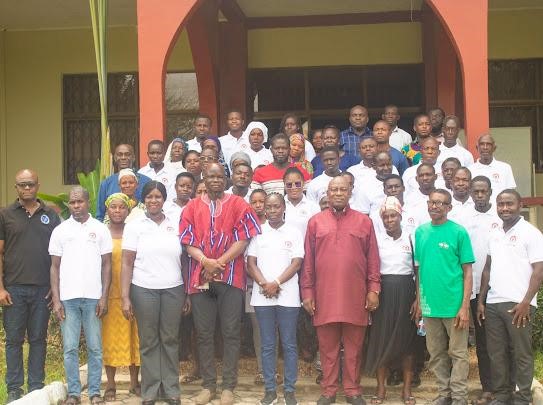
The CSIR-Crops Research Institute (CSIR-CRI) and the CSIR-Plant Genetic Resources Research Institute (CSIR-PGRRI) brought together key agricultural stakeholders on April 30, 2024, for a workshop titled, “SEEDS FOR RESILIENCE (SfR) GERMPLASM USER GROUP FEEDBACK AND REVIEW WORKSHOP“. Held at the CSIR-CRI Training Center, Fumesua-Kumasi, the workshop aimed to strengthen linkages between germplasm indigenous leafy vegetable (ILV) germplasm conservation, participatory evaluation, selection and use.
The well-attended event featured presentations, interactive sessions, and group discussions focused on the Seeds for Resilience (SfR) project’s Germplasm User Group (GUG) concept. Participants included representatives from the CSIR-CRI, the Ministry of Food and agriculture (MoFA), ILV Traders, students, processors, and farmers’ groups.
Opening Remarks
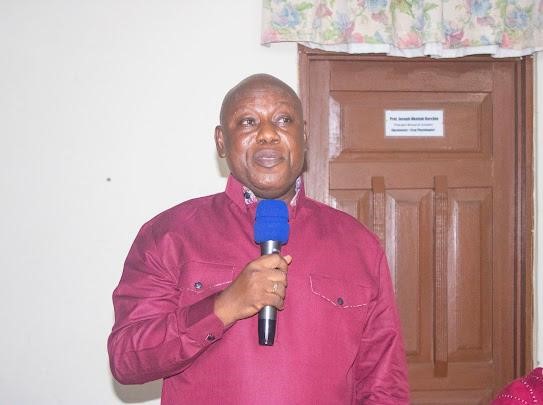
The workshop commenced with the Director of the CSIR-CRI, Prof. Moses Brandford Mochiah underscoring the significance of the project and urging active engagement from all participants. The Director of the CSIR- Plant Genetic Resources Research Institute (PGRRI), Dr. Daniel Ashie Kotey welcomed the attendees and informed them of the plans to upscale traditional leafy vegetables cultivation and use through enhanced access to improved germplasm. “We want traditional leafy vegetables to gain the same level of prominence as rice in Ghana because traditional leafy vegetables have the potential to ensure food, nutrition security and livelihoods in Ghana.” The representative standing in for the DCE of the Atwima Nwabiagya North District also expressed appreciation for the project’s inclusion of their district and pledged support for local farmer involvement.
Keynote Address
Prof. Mochiah provided the keynote address emphasising the importance of germplasm conservation and utilisation in enhancing agricultural productivity. He highlighted the value of conserving Ghana’s indigenous vegetables and called for collaboration between researchers, policymakers, and farmers to ensure that indigenous leafy vegetables become prominent, well-cultivated, and widely accepted throughout the country. Prof. Mochiah stressed that these efforts are crucial for food security and healthy diets for Ghanaians.
Brief Overview of the Workshop
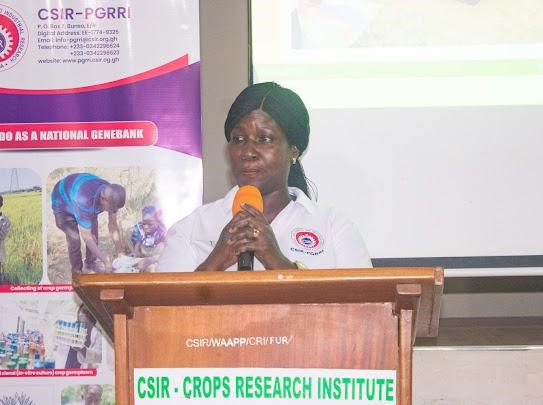
Moving forward, Dr. Patricia Pinamang Acheampong, a lead scientist of the project, highlighted the role of genebanks in this initiative. She made it known that the CSIR-CRI is working with the CSIR-PGRRI to leverage their diverse accessions of indigenous leafy vegetables. Dr. Acheampong elaborated further that, “At the moment, we’re multiplying the selected accessions for distribution back to farmers. Since the farmer chose the varieties themselves, we’re confident of their acceptance.” She further added that CSIR-CRI will also provide technical support throughout the production cycle, ensuring farmers have the knowledge and resources needed for a successful harvest.
The CSIR-PGRRI provided 20 indigenous leafy vegetable accessions for research and participatory varietal selection by farmers in 2023. The farmers chosen for the selection hailed from Barekese and Boadi, which are localities that are well known for cultivating indigenous leafy vegetables. The farmers who took part in the participatory varietal selection were also invited to the workshop to enable them receive updates on activities the project was currently embarking on and the way forward.
Farmer’s Testimonials and Challenges
Speaking to Atta Kweku, a participating farmer from Barekese Ataase shared his experience, stating, “I’ve learned a lot about traditional leafy vegetables through this project. In my community, we have even established a farmer group for collaboration to enhance production. The project has also introduced us to buyers and provided training on good agricultural practices. In all, the activities we have undertaken under the Seeds for Resilience project have led to increased yields and better quality of produce.”
Afia Buakyewaa, another participating farmer, echoed the same sentiments. “I’ve expanded my knowledge and planting techniques with traditional leafy vegetables. This rainy season, I intend to plant extensively to increase yield and sales. I believe widespread cultivation of these indigenous vegetables can give farmers like us a comfortable life.”
Aside the testimonials, the farmers also addressed the challenges they faced during GUG activities. The major challenges enumerated by the farmers included limited access to land, particularly in urban areas where lowlands, traditionally used for planting such crops, are being converted for housing development.
Interactive Sessions and Group Work
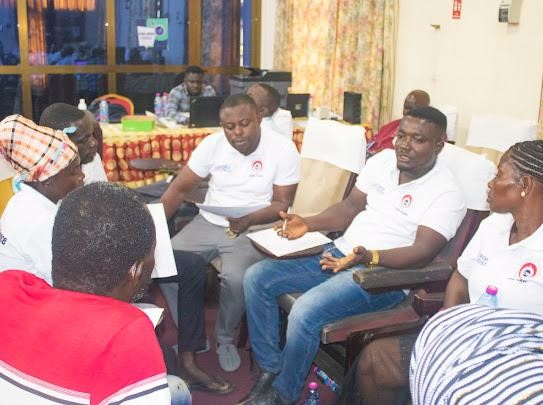
There was a question-and-answer (Q&A) session during the workshop that allowed participants to seek clarification on key issues and share their experiences. Following the Q&A session, breakout sessions where participants were divided into groups that actively discussed issues surrounding the ILV GUG concept and its key lessons and developed a roadmap for the future were held. The workshop concluded with group presentations summarising outcomes from the breakout sessions. After the presentations, participants were informed that the valuable insights gleaned from the workshop will be compiled into a communiqué that will be shared among key stakeholders to guide initiatives geared towards improving ILV germplasm conservation and use.
The Value of Indigenous Leafy Vegetables
Throughout the workshop, emphasis was placed on the unique attributes of indigenous leafy vegetables. Speaking to the media after the event, the Director of the CSIR-PGRRI, Dr. Daniel Ashie Kotey stressed the importance of these nutrient-rich vegetables. “We have observed that many Ghanaian farmers focus on planting exotic vegetables, despite the superior nutritional value of indigenous vegetables. What most people do not know is that indigenous leafy vegetables are better adapted to local farming systems and conditions and are comparatively more tolerant to pests and diseases, hence reducing the need for spraying pesticides.” Dr. Patricia Acheampong also emphasised the importance of increasing awareness about indigenous leafy vegetables. She stated, “As compared to the northern part of Ghana, people in the southern part of the country often overlook indigenous leafy vegetables. However, by encouraging patronage of these vegetables, we can improve livelihoods, health, and the Ghanaian economy.”
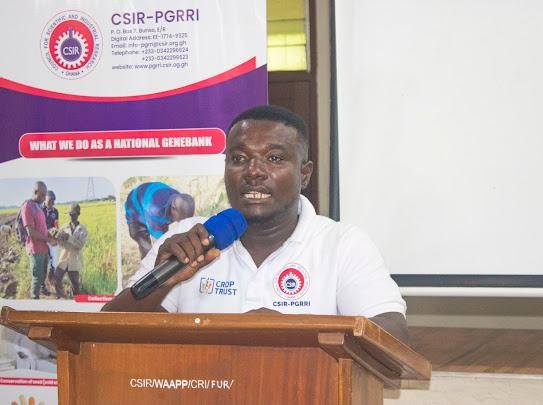
Way Forward
The CSIR-CRI’s “Seeds for Resilience” workshop funded by the Global Crop Trust proved to be a resounding success, since it brought together key players in the agricultural sector to explore the potential of indigenous leafy vegetables. Through presentations, interactive sessions, and group discussions, the workshop fostered a collaborative environment focused on promoting ILV germplasm utilisation.
The enthusiastic participation of farmers, researchers, and policymakers underscored the value proposition of indigenous leafy vegetables. By leveraging the unique benefits of ILVs, such as their superior nutritional value and natural pest tolerance, the SfR project has the potential to enhance food security, improve farmer livelihoods, and contribute to a healthier Ghanaian diet.
Authors: Patricia Konadu Mensah, Bernard Sakyiamah, Enoch Bobie Agyemang, Linda Agyeman, Lynda Nsafoah, Dennis Gyasi Boakye
